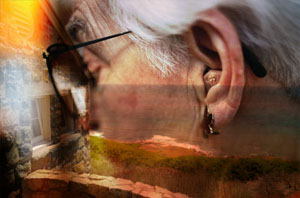Apr 22, 2025
Apr 22, 2025
by Walter Durk
 Thin paths, worn into the rock-strewn field, slowly wind their way downward to meet a glistening sea below. Within this stony field, thistles stand erect, proudly displaying their prickly bracts and rosy blooms. Wild purple violets at their feet soften an otherwise sparse landscape.
Thin paths, worn into the rock-strewn field, slowly wind their way downward to meet a glistening sea below. Within this stony field, thistles stand erect, proudly displaying their prickly bracts and rosy blooms. Wild purple violets at their feet soften an otherwise sparse landscape.
A sheet of dark blue sea hugs the grayish coastline, stretching far toward the North and South, meeting only the sky at a distant Western horizon.
Above, on a Northern California cliff stands a rugged log house, inhabited by a lonely woman named Alicia, who has lived here for many years. When she was a younger woman, she was a classical pianist who toured throughout Europe and North America.
Inclined to be reclusive, she cautiously surveys the panorama prior to venturing out for her walk toward the sea. Preferring not to be recognized, she wears a wide-brimmed cloth hat that flops slightly downward over her face; wide-lensed sunglasses complete her disguise.
She carries a small pruning shear in one of her pockets. A canvas bag hangs from a strap on her shoulder. Her lanky figure casts a lean shadow onto the gravel path upon which she walks to reach her destination.
Crossing a narrow paved road, she reaches the hillside so familiar to her and embarks upon one of the winding paths. Feeling the hard irregularity of the stones beneath her feet makes her uncomfortable and slightly unsteady.
To one side of the path, just within reach, a thistle stands. She examines it for awhile. Her eyes occasionally drift toward the sea, then revert back to the thistle. She thinks of her deceased husband, and how the thistle is a symbol of his Scottish heritage.
She slips the thick canvas bag off her shoulder, propping it open on the path. She reaches carefully into her pocket to extract the pruners. Grabbing the thistle by its stalk with one hand, she quickly snips the stalk with the other, dropping the thistle bloom into the bag. With the pruner back in her pocket and her bag again on her shoulder, she retraces the exact path that led her here.
From a distance, her profile can barely be seen upon the hillside of the Northern cliff.
Upon the cliff where her home stands, the brilliant sun accentuates a figure in a plain cloth dress. A dress with hints of yellowed discoloration, flowing toward her bony ankles.
Sandals, black-chocolaty thick straps of leather, surround her too-large feet, the skin of which bears the resemblance of a well tanned hide. She is like a willow with a rough bark exterior.
Her angular face and well-defined nose shines, glistening, moistened by beads of perspiration.
As she scans the landscape below which stretches toward the open sea, the iris of her eyes radiates a spectrum of colors not unlike a faceted crystal hit by a bright ray of sunlight. Two large hands bearing the appearance of a man's, solid and sinewy, hang by her side. She is an unusual woman, slightly masculine in her poise, angular in her gait. Her hair, brown with streaks of white, loosely falls beneath her neckline.
She turns to go home, as the wind parches her face and the taste of brine lingers on her lips. In harmony with, yet distinct from the surrounding landscape, her home exalts its craftsmanship with its vaulted roof and three-sided deck, supported by thick trunks of trees. Watching her approach it, her slight frame swaying with the wind, one might think her to be completely out of place with her surroundings.
As she deliberately opens the entryway, massive beams of oak, magnificent relics of nature, run vertically and horizontally throughout. Knotted-wooden walls, ceilings and floors of pine and cedar, reflect warm, golden hues onto the interior of the house. One could easily sense the softness and tranquility of being encased by nature tamed.
Irregular gray stones, their harsh weathered surfaces prominent, comprise most of another wall from floor to ceiling.
She views some of the objects she placed upon the timber mantle in years past. Pronounced swirls of amber contrast sharply with the richer, darker grains of the beam.
Her fingertips touch a soft, silver frame displaying a photograph of her husband, Andrew Morrison, seated behind a substantial desk. She smiles softly. He was formally dressed in a dark business suit, with a crisp white shirt and tie.
His eyes peered, staring at the camera.
He was named after his grandfather, who in his time was a legendary Scottish banker of huge renown throughout Great Britain. Her husband, Andrew, had also been an avid deep-sea fisherman, who on Saturdays would frequently embark from a favorite pier near the Golden Gate to spend the better part of the day thirteen miles or so out on the ocean. There, he fished with companions of a similar bent, angling for Salmon while imbibing single malt Scotch. On one of these outings, a sudden squall encapsulated their boat, drawing it deeply into the sea.
Melancholy, she glances further into the room, and walks toward the opposite side, where two picture windows frame the sea and sky. Gold and silver trophies fill a cabinet nearby.
Propping the canvas bag against a leg of the piano, she extracts the freshly cut thistle and places it in a large cut-crystal vase on top of the dull, black grand piano.
Seating herself on a cushioned stool facing the keyboard, she glances out toward the sea, then looks again at the thistle she placed in the vase. Her muscular hands, engaging black and white keys, create a resonance of powerful, yet ethereal tones with the beauty of "Valses Poe'ticas".
17-Sep-2006
More by : Walter Durk